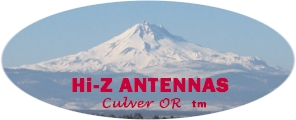

HIGH PERFORMANCE
HF RECEIVING SYSTEMS & COMPONENTS
Why Hi-Z ?
Setting the new standards. SNIF (signal to noise improvement factor) came from the Syracuse University Research Corporation. As quoted from the 1 June 1967 Interim report, " The improvement factor (SNIF) is shown to depend on the geometry of the array, on the phasing network and on the ratio of atmospheric noise power to internal system noise power." Hi-Z believes this to be a more understandable method of evaluating total receiving system performance. SNIF is easier to understand as a means of comparison.
Hi-Z Antennas vs. Beverages
Beverages - Base line Single direction Beverage, Dual Direction Beverage
|
Models |
Beverage, comparable length, see foot notes
|
RDF Hi-Z |
Directions |
Bands Hi-Z |
# of Beverages to = Hi-Z Directions |
Issues / Comments |
Foot Print – Hi-Z |
|
Hi-Z 2 (2-4) |
540-880 ft Long |
~9 |
2 or 4 |
Tba |
1 or 2 dual |
Beverages require a lot of acreage |
40 -50 feet |
|
Hi-Z 3 |
880 ft Long |
9.2 |
6 |
160, 80, 40 |
3 dual |
|
40 - 50 feet |
|
Hi-Z 4 |
880 ft Long |
>=12.2 |
4 upgradeable to 8 (4-8PRO UP) |
160, 80, 40 |
2 dual |
|
80 ft sq
|
|
Hi-Z 4-8PRO |
540-880 ft Long |
>=12.2 |
8 directions |
160, 80, 40 |
4 dual |
|
113 foot dia. |
|
Hi-Z 8 |
880- 1100ft Long + |
>=13.5 |
8 directions |
160 or 80 |
4 dual |
|
Hi-Z 200 ft dia.
|
Beverage Issues:
· Maintenance – medium to high
· Lots of land - acres
· Less S/N Performance
· Less directive
· Poor low angle response
· Performance effected by ground environment
Hi-Z Benefits:
· Hi-Z compares to 1100 ft phased beverages
· Significantly less land required
· Less cabling required (one coax feed, one control cable)
· Hi-Z 8 is a SUPER Directive array
· Better suited in tropical or high noise environments due to pattern response
· Not effected by poor ground
· No radials required